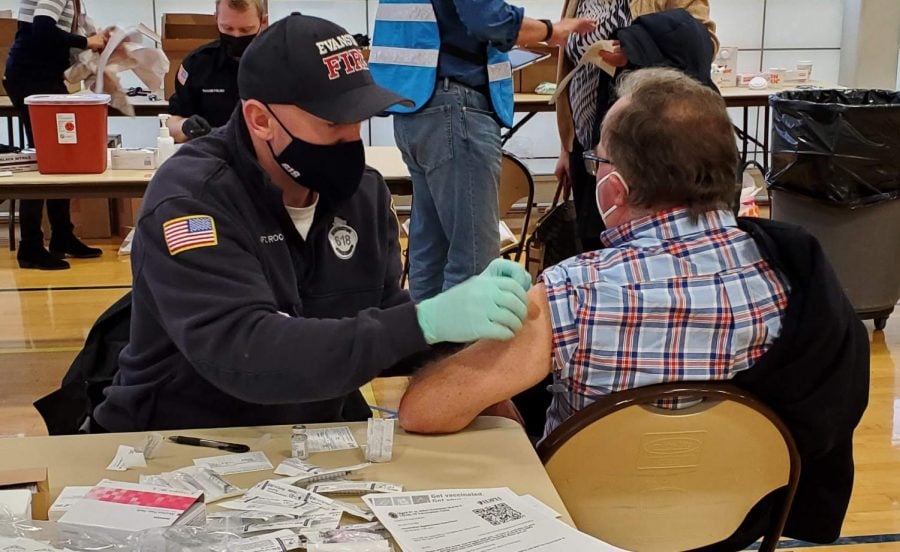City Council retains COVID-19 response staff with ARPA funds, delays other allocations
Photo courtesy of the Mayor’s Office
An Evanston resident is bandaged after receiving a vaccination. The city’s COVID-19 response staff will be retained through 2022 using funds from the American Rescue Plan Act.
November 3, 2021
City Council voted unanimously Monday to allocate more than half a million dollars in federal funding to retain the Health & Human Services Department’s COVID-19 response staff.
The department will receive $575,000 of the city’s incoming $43 million federal grant from the American Rescue Plan Act. Funds from the act can only be used toward specific types of local projects, including those related to pandemic recovery. This disbursement will be used to pay salaries through 2022 for the city’s contact tracers, specialized healthcare workers frequently visiting long-term medical care facilities and other medical staff.
Health & Human Services Director Ike Ogbo told council members the two Illinois Department of Public Health grants that currently support staff salaries will expire at the end of the year.
City response staffers have been increasingly anxious about the immediate futures of their job security and salaries, Ogbo said.
“It will help calm the nerves of our temporary staff if I can relay a message that (the funding) has been approved in council tonight,” Ogbo said. “It took me a while to assemble the professionals that we have, and I don’t want to lose them.”
Ogbo also said the IDPH will likely approve new grants for 2022, which the city could use down the line to reimburse the spent ARPA funds for a different use.
The council also discussed four other proposed ARPA funding allocations, but it ultimately postponed all four votes to later dates.
The proposals included replacing sidewalks and landscaping along Orrington Avenue and Chicago Avenue, expanding storefront modernization grants to promote outdoor dining improvements and hiring grant management staff to ensure compliance with federal and state guidelines.
The largest proposed allocation was $1 million toward renovating the AUX, a planned Black-owned and wellness-focused commercial hub in the 2nd Ward currently in its fundraising phase. The space will host 10 businesses and aims to open in fall 2022, after which the building’s current owner, the Growing Season, will sell shares of the building’s ownership back to the community.
Ald. Cicely Fleming (9th) said an investment from the city would provide Black businesses with much-needed capital, signalling a tangible commitment to racial equity.
“Why African American businesses take so long to get started is that lack of capital,” Fleming said. “This is the chance for us to put our money where our mouth is, in a city in which we proclaim to be doing reparations.”
While councilmembers broadly support allocating ARPA funding to The AUX in general, several raised concerns about committing to fund a specific project before the council more clearly allocates funding for broader categories in the 2022 budget.
Ald. Jonathan Nieuwsma (4th) said he supports the proposal, but he wants to wait until more budget information is available.
“I don’t think we should be allocating money from the economic development bucket until we have the complete picture in front of us,” Nieuwsma said. “This shouldn’t be just first come, first serve. And that’s not to not to be dismissive of the AUX folks, because they have followed the procedure that we have asked them to follow.”
The council voted 8-0 to return the proposal to the Economic Development Committee, with Fleming abstaining. The committee will reconsider the proposal before returning it to the council for a full vote.
Email: [email protected]
Twitter: @alexhairysun
Related Stories:
— City department heads pitch ARPA employee additions in 2022 budget
— The AUX seeks to foster community with Black-owned businesses at the forefront
— Council discusses American Rescue Plan Act funds, CARP allocations












